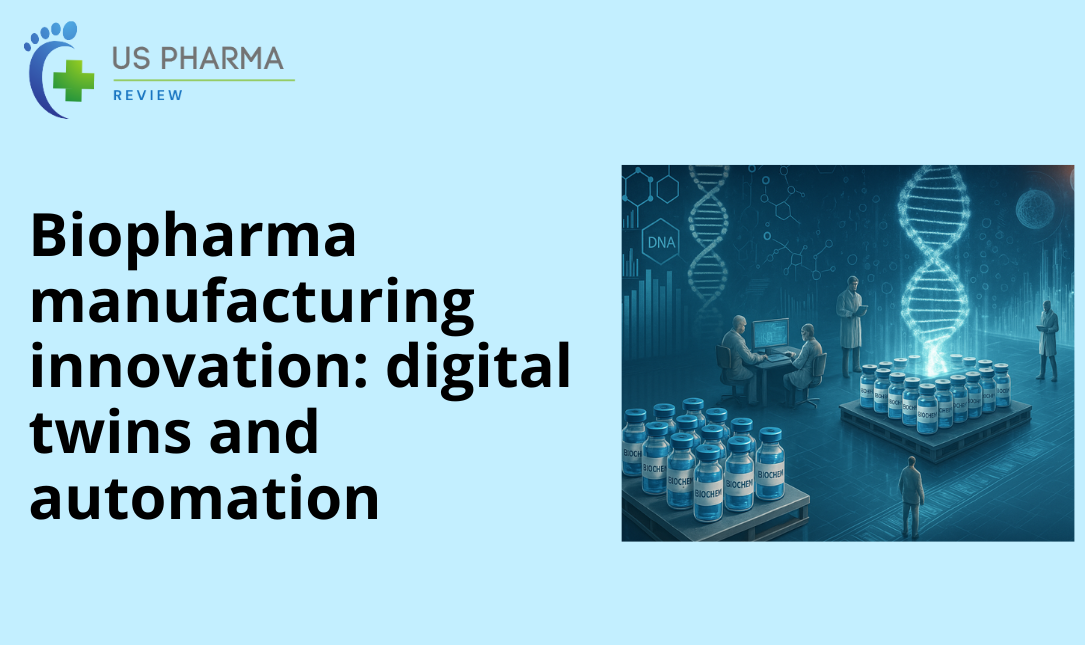Travel Tips
Lorem ipsum dolor sit amet, consectetur adipiscing elit.

The biopharma sector is undergoing a significant transformation, driven by cutting-edge technologies that enhance efficiency, quality, and speed. Biopharma manufacturing innovation is no longer just a concept; it has become a tangible force reshaping production pipelines. From small-molecule drugs to complex biologics, the integration of digital twin biomanufacturing and automated biopharma production is revolutionizing the way medicines are developed and manufactured.
Companies are increasingly investing in smart factory biotech setups, where advanced data analytics, predictive modeling, and robotics converge to optimize every stage of production. These innovations not only improve operational performance but also reduce costs, accelerate timelines, and ensure greater regulatory compliance.
One of the most impactful elements of biopharma manufacturing innovation is the adoption of digital twin biomanufacturing. A digital twin is a virtual replica of a physical production system, enabling real-time monitoring, simulation, and predictive analysis.
In biopharma manufacturing, digital twins allow companies to:
Simulate complex bioprocesses before implementation.
Predict potential bottlenecks and quality issues.
Optimize resource allocation and production schedules.
By implementing digital twin technology, biopharma companies can identify inefficiencies and fine-tune their operations without disrupting actual production lines. This proactive approach not only enhances product quality but also supports regulatory compliance by providing traceable, real-time data on manufacturing processes.
Moreover, digital twins play a critical role in continuous process verification, a requirement under modern regulatory frameworks. This capability ensures that biopharma manufacturing innovation is not only technologically advanced but also aligned with the highest standards of patient safety.
Another cornerstone of biopharma manufacturing innovation is automated biopharma production. Automation has become indispensable in handling complex biologics, where precision and consistency are paramount.
Automated systems in biopharma manufacturing include:
Robotic liquid handling and sample management.
Automated cell culture and fermentation monitoring.
AI-driven process optimization and quality control.
These technologies enable manufacturers to reduce human error, improve throughput, and accelerate time-to-market for critical therapies. Additionally, automated systems integrate seamlessly with digital twin biomanufacturing platforms, providing a comprehensive view of operations that allows predictive interventions before issues arise.
The adoption of automation also supports sustainability efforts by minimizing waste, optimizing energy consumption, and reducing the need for redundant human labor. As companies strive to meet both regulatory and environmental goals, automation has emerged as a pivotal aspect of biopharma manufacturing innovation.
The convergence of digital twin biomanufacturing and automation paves the way for smart factory biotech setups. These advanced facilities integrate IoT devices, AI analytics, and connected machinery to create self-optimizing production environments.
Key benefits of smart factories in biopharma include:
Real-time data-driven decision-making.
Enhanced scalability and flexibility in production.
Greater operational transparency and traceability.
A smart factory biotech environment not only boosts efficiency but also enhances agility, enabling manufacturers to respond quickly to market demands, supply chain disruptions, or emerging therapeutic needs. For example, the rapid development and scaling of vaccines during global health crises highlight how smart, automated production systems can be life-saving.
By combining automation, AI, and digital twins, smart factories represent the pinnacle of biopharma manufacturing innovation, where advanced technology meets operational excellence.
Several biopharma companies are already demonstrating the transformative power of these technologies:
Predictive Biologics Production: Using digital twin biomanufacturing, a leading biologics manufacturer was able to simulate production runs, reducing batch failures by 30% and optimizing raw material usage.
Automated Cell Therapy Manufacturing: A pioneering firm implemented automated biopharma production systems for cell and gene therapies, accelerating production timelines by 25% while maintaining strict compliance standards.
Integrated Smart Factories: Some companies are investing in full-scale smart factory biotech facilities, combining robotics, IoT, and AI to create fully connected, adaptive manufacturing ecosystems capable of handling multiple therapeutic pipelines efficiently.
These examples underscore how biopharma manufacturing innovation is no longer a future goal—it is actively reshaping the industry today.
Biopharma manufacturing innovation directly complements advances in precision medicine. By integrating digital twins and automated production, companies can develop personalized therapies faster and more reliably. The ability to simulate patient-specific responses and rapidly scale production ensures that innovative treatments reach patients without unnecessary delays.
For readers interested in exploring this further, check out our article on precision medicine biopharma, which highlights how manufacturing innovations support the development of tailored therapies.
While biopharma manufacturing innovation offers significant advantages, it also presents challenges:
High initial capital investment for digital twin and automated systems.
Integration complexities with existing legacy equipment.
Regulatory adaptation to novel production technologies.
Despite these hurdles, the trajectory of the industry is clear. The continued adoption of digital twin biomanufacturing, automated biopharma production, and smart factory biotech models will drive higher efficiency, improved product quality, and greater responsiveness to patient needs.
Looking ahead, the future of biopharma manufacturing innovation will likely see even more AI integration, predictive analytics, and modular production systems that allow companies to pivot quickly in response to emerging therapeutic demands.
The landscape of biopharma production is evolving rapidly, driven by biopharma manufacturing innovation that harnesses the power of digital twin biomanufacturing, automated biopharma production, and smart factory biotech concepts. These technologies are enabling faster, safer, and more efficient drug manufacturing, transforming both the operational and strategic capabilities of biopharma companies.
As these innovations continue to mature, the industry will not only improve its production capabilities but also expand access to life-saving therapies, including precision medicine solutions. For organizations seeking to remain competitive, embracing these innovations is no longer optional—it is essential for long-term growth and patient impact.